You are here
New Releases
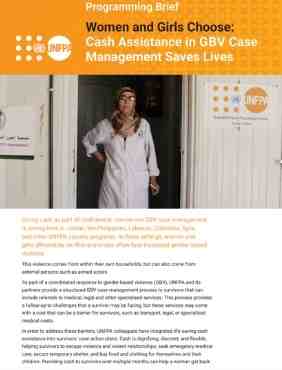
Women and Girls Choose: Cash Assistance in GBV Case Management Saves Lives
As part of a coordinated response to gender-based violence (GBV), UNFPA and its partners provide a structured GBV case management process to survivors that can include referrals to medical, legal and other specialised services. This process provides a follow-up to challenges that a survivor may be facing, but these services may come with a cost that can be a barrier for survivors, such as transport, legal, or specialised medical costs. To address these barriers, UNFPA colleagues have integrated life-saving cash assistance into survivors’ case action plans. Cash is dignifying, discreet, and flexible, helping survivors to escape violence and violent relationships, seek emergency medical care, secure temporary shelter, and buy food and other essentials for themselves and their children. UNFPA is continually refining its approach based on feedback from cash recipients, their case managers, and implementing partners in the field. This document presents key insights and knowledge gained from these efforts.
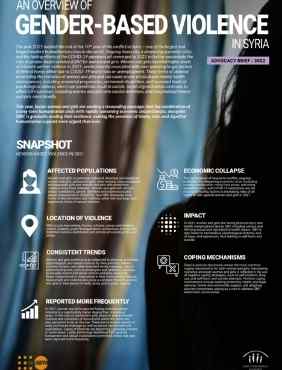
2022 Gender Based Violence Advocacy Brief
The year 2021 marked the end of the 10th year of the conflict in Syria — one of the largest and longest modern humanitarian crises in the world. Ongoing insecurity, a deepening economic crisis, and the lasting effects of the COVID-19 pandemic all converged in 2021 to further exacerbate the risks of gender-based violence (GBV) for women and girls. Women and girls reported higher levels of intimate partner violence in 2021, predominantly associated with men spending longer periods of time at home, either due to COVID-19 restrictions or unemployment. These forms of violence are eroding the resilience of women and girls and can cause severe physical and mental health consequences, including unwanted pregnancies, permanent disabilities, and increased levels of psychological distress, which can sometimes result in suicide. Social stigmatisation continues to affect GBV survivors, including women and girls who survive detention, and marginalised women and girls more broadly.
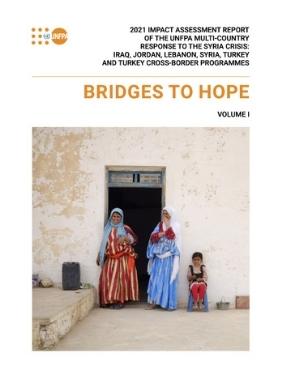
Bridges to Hope: Key findings from the Regional Impact Assessment of UNFPA’s Syria Response / 2021
Since the onset of the Syria crisis, UNFPA has been providing sexual and reproductive health and gender-based violence services to Syrian refugees, displaced people, and host communities. UNFPA has conducted its fifth regional assessment spanning Syria, Turkey, Lebanon, Jordan, and Iraq to gauge the impact its programmes have had on the wellbeing of women, girls, boys, and men. The assessment also incorporated COVID-19 and its far-reaching ramifications throughout the process.
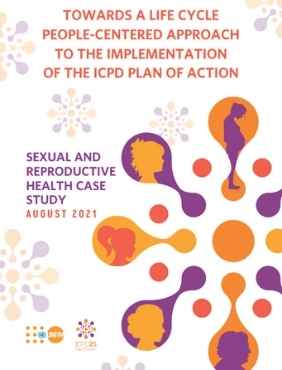
TOWARDS A LIFE CYCLE PEOPLE-CENTERED APPROACH TO THE IMPLEMENTATION OF THE ICPD PLAN OF ACTION
This paper was prepared as part of the Asian and Arab Parliamentarians’ Project on Population and Development, - an ongoing cooperation project between the UNFPA Arab States Regional Office (ASRO), the Asian Population and Development Association (APDA) and the Forum for Arab Parliamentarians for Population and Development (FAPPD) - which is funded by the Government of Japan.
This research paper examines the concept of how people-centered and life cycle approaches might help move forward the implementation of the Cairo declaration 1994 and the Plan of Action of the International Conference on Population and Development (ICPD PoA 1994) and its subsequent reviews. It shed light on the achievements, gaps, challenges, and emerging issues related to the implementation of the ICPD through regional and global reviews with a focus on sexual and reproductive health.
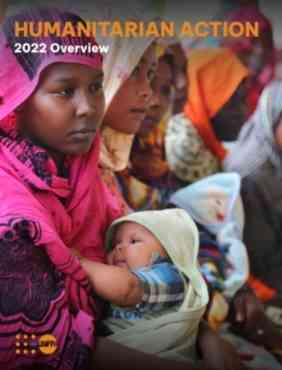
Humanitarian Action Overview Report 2022
The 2022 Humanitarian Action Overview highlights the world’s biggest crises for women and girls and the urgent need to increase international humanitarian assistance to alleviate human suffering and meet rising needs.
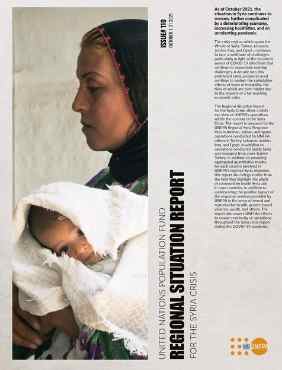
UNFPA Regional Situation Report for the Syria Crisis — October 2021
As of October 2021, the situation in Syria continues to worsen, further complicated by a deteriorating economy, increasing hositilities, and an unrelenting pandemic. The crisis region, which spans the Whole of Syria, Turkey, Lebanon, Jordan, Iraq, and Egypt, continues to face a multitude of challenges, particularly in light of the recurrent waves of COVID-19 infections that continue to exacerbate existing challenges. A decade into this protracted crisis, people in need continue to endure the cumulative effects of years of instability, the risks of which are even higher due to the impacts of a far-reaching economic crisis.
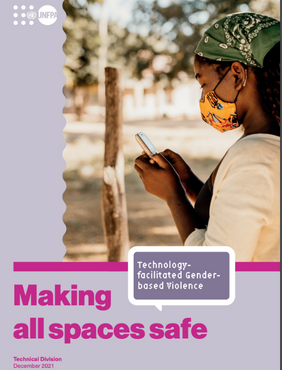
Technology-facilitated Gender-based Violence: Making All Spaces Safe
As the world continues to evolve and expand in the use of technology and platforms, so too does the expansion of spaces through which violence can be perpetrated. This was evidenced no more so than during the COVID-19 pandemic where containment efforts reduced access to information and services driving increased use of technology and online spaces. This paper serves as an alarm bell for the international community, digital and feminist movements, private technology companies and national Governments to act in unison to end the rising scourge of technology-facilitated gender-based violence.
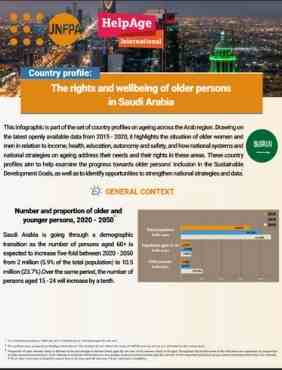
The rights and wellbeing of older persons in Saudi Arabia
These country profiles map the situation of older persons in five countries in the Arab region: Palestine, Iraq, Tunisia, Saudi Arabia and Egypt. The profiles were developed by HelpAge International with support from UNFPA Arab States Regional Office. They shed light on the situation of older women and men in relation to income, health, education, autonomy and safety, and highlight how national systems and strategies on ageing people address their needs and rights in these areas. The aim of these country profiles is to help monitor the progress achieved towards older persons’ inclusion in the Sustainable Development Goals, and identify opportunities to strengthen national strategies and data.
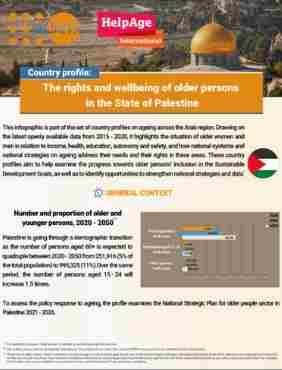
The rights and wellbeing of older persons in the State of Palestine
These country profiles map the situation of older persons in five countries in the Arab region: Palestine, Iraq, Tunisia, Saudi Arabia and Egypt. The profiles were developed by HelpAge International with support from UNFPA Arab States Regional Office. They shed light on the situation of older women and men in relation to income, health, education, autonomy and safety, and highlight how national systems and strategies on ageing people address their needs and rights in these areas. The aim of these country profiles is to help monitor the progress achieved towards older persons’ inclusion in the Sustainable Development Goals, and identify opportunities to strengthen national strategies and data.
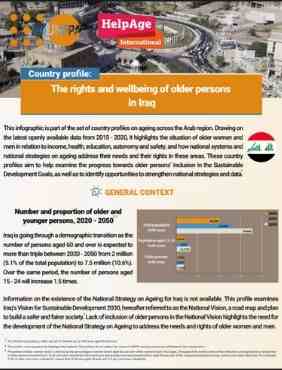
The rights and wellbeing of older persons in Iraq
These country profiles map the situation of older persons in five countries in the Arab region: Palestine, Iraq, Tunisia, Saudi Arabia and Egypt. The profiles were developed by HelpAge International with support from UNFPA Arab States Regional Office. They shed light on the situation of older women and men in relation to income, health, education, autonomy and safety, and highlight how national systems and strategies on ageing people address their needs and rights in these areas. The aim of these country profiles is to help monitor the progress achieved towards older persons’ inclusion in the Sustainable Development Goals, and identify opportunities to strengthen national strategies and data.